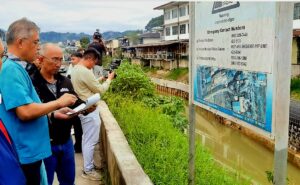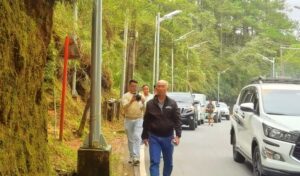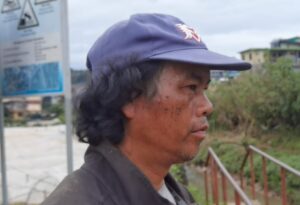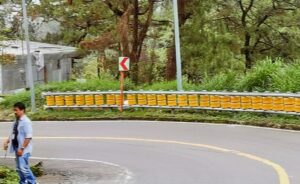Flood control structure obstructs water flow, solar light units lacking and overpriced, guardrails overpriced – Magalong
ICI special adviser Benjamin Magalong talks to La Trinidad Municipal Engineer Benedict Pineda about the details of the Bolo Creek Flood Control Project at the site.
Photos and text by: Dave Leprozo, Jr.
Keeping true to his role as special adviser to the Independent Commission for Infrastructure (ICI) Baguio City Mayor Benjamin Magalong expressed dismay on Tuesday, 16 September 2025, after discovering three Department of Public Works and Highways (DPWH) funded infrastructure projects as faulty and overpriced.
Inspection on the P177 million Bolo Creek flood control project, solar street lights, and road safety guardrails proved questionable.
The structure to mitigate flooding, lacked engineering specifications and appeared to obstruct the natural flow of water, Magalong pointed out as he pointed to the structures alongside Bolo Creek. La Trinidad Municipal Engineer Benedict Pineda failed to explain its technical purpose of the project to Magalong at the site. He requested the local government to submit feasibility and technical documents on the project saying that he would tap experts to evaluate this.
La Trinidad farmer and resident Asipulo, Ifugao native Jimmy Dulnuan told Cordillera News Agency that the Bolo Creek flood control project is useless as the flooding got worst along the farmlands he’s been farming for the last 15 years.
Checking on the solar street light installations, the DPWH contract indicated that 1,290 units were supposed to be placed from Irisan to La Trinidad. However, only 691 units were installed. Magalong estimated the cost of the posts and lights at P34,000.00 to P46,000.00 and the project unit costs from P130,000.00 to P209,000 were more than triple the factory price. He observed that some were not working.
As for the road safety guardrails, Magalong compared the market price of P30,000.00 per meter to the stated price of ₱100,000 per meter in the contract.
Magalong is coordinating the ICI inspections with the Criminal Investigation and Detection Group (CIDG) for the filing of appropriate criminal charges to go beyond contractors and those found in the deeper networks of corruption.






